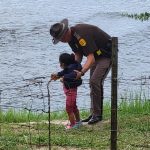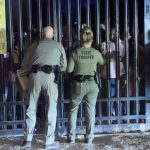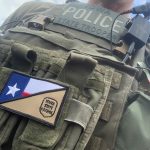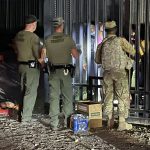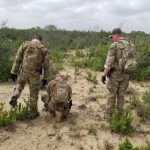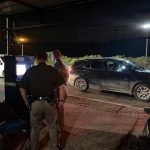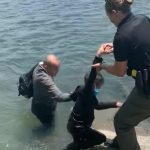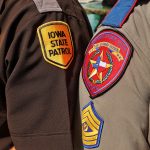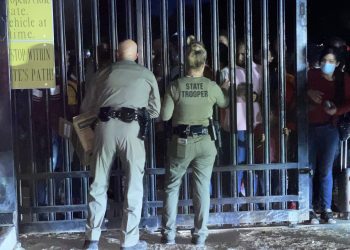DES MOINES, Iowa – Gov. Kim Reynolds announced on Wednesday that the 28 Department of Public Safety officers deployed to U.S. southern border to aid law enforcement and border security efforts had concluded their mission. Operation Lone Star provided the Department’s support to the Texas Department of Public Safety in the Del Rio area from July 10-20.
This support was in response to a request from Texas Governor Greg Abbott and Arizona Governor Doug Ducey on June 10 seeking law enforcement support from all 50 states. Their request was made through Iowa’s existing EMAC, a national interstate mutual aid agreement administered by the Iowa Department of Homeland Security and Emergency Management that enables states to share resources during a disaster.
“Our officers increased law enforcement visibility in border towns, provided humanitarian aid, worked as a force multiplier for the Texas Department of Public Safety and supported the enforcement of the laws in a variety of ways. They provided tactical support, patrolled dangerous streets, and deployed SWAT-trained troopers to pursue and detain illegal migrants in the desert. In this role, they successfully compensated illegal weapons and drugs and thwarted human traffickers,” Reynolds said during a press conference.
A total of 28 Iowa Department of Public Safety law enforcement officers volunteered to assist the Texas Department of Public Safety with four key mission tasks, including traffic duties, humanitarian efforts, tactical operations, and human smuggling operations. Those officers included 12 road Iowa State Patrol Troopers, 12 tactical operators, three command staff supervisors, and one bilingual investigative agent.
Iowa State Patrol Troopers paired with Texas Highway Patrol Troopers to provide law enforcement duties to ensure public safety in the Del Rio area. These officers also worked the heavily trafficked Rio Grande River crossing, helping with rescue efforts and addressing humanitarian concerns.
The mission of tactical operators focused on disrupting criminal activities with teams identifying and searching locations where human smuggling was occurring, identifying drug/narcotics offenses, and performing surveillance activities designed to identify criminal activities.
The DPS deployment consisted of 12-hour shifts and concluded with 5,000 hours of duty time. The participating officers represented 5 percent of the Department’s sworn workforce.
The operation concluded last week.
Iowa joined Florida, Idaho, Arkansas, Nebraska, Ohio, and South Dakota sent National Guard troops or law enforcement to the southern border.
“This crisis at the border was and remains a humanitarian crisis, with consequences that reach far beyond Texas and Arizona. While the majority of those attempting to enter the country illegally are single adults, we also know a significant number of children are being cruelly exploited by coyote smugglers and bad actors of all stripes. To criminals like these, our border looks like an open invitation, and it’s vulnerable migrants and law-abiding citizens who are paying the price,” Reynolds stated.
She also noted an increase in illegal drug and weapons seizures at the southern border. There was a 300 percent increase in fentanyl seizures in May of 2021 as there were in the same month the year prior. Seizures increased again in June, with this year’s total now 78 percent higher than all of 2020.
Iowa specifically saw 523 grams of fentanyl seized between January and May 2020. Over that same period in 2021, roughly 6,641 grams of fentanyl were seized, increasing by 1,148 percent. According to Customs and Border Protection, 93 percent of heroin found in our country was initially smuggled across the southern border.
“Twelve straight days, 12-hour sometimes 16-hour shifts, extreme heat, unforgiving terrain, challenging geopolitical dynamics, but the men and women of the Iowa State Patrol showed up,” Stephan Bayens, Commissioner of the Iowa Department of Public Safety, said during the press conference. “They did their job. They came to the aid of the people of Texas. They showed care and compassion to scores of undocumented migrants. And they supported their brothers and sisters in law enforcement with the Texas Department of Public Safety. They showed up.”
Bayens pointed out the spike in criminal activity, stating that in the eight counties that make up the Del Rio area in Texas, law enforcement 331 pursuits between March and May. In comparison, Iowa only had 333 pursuits statewide in 2020 for the entire calendar year.
He added that car thefts, property thefts, burglaries, criminal trespass, property damage were all on the rise. The Texas Department of Public Safety initiated high visibility patrols to bring those trends under control but lacked the personnel to do it safely.
“That’s really where our folks came in. They operate as a force multiplier for the Texas Department of Highway Patrol. Our troopers were paired up with troopers in Texas, and operated two-person cars, and conducted those high visibility patrols,” Bayens said.
The governor’s office said it would continue to evaluate the needs on the border and whether the state’s law enforcement might be helpful to officials on the border. However, any future decision they said will be subject to Iowa’s own law enforcement needs.
The total cost of the deployment is roughly $300,000. Reynolds said that Iowa will likely bear the cost of the deployment, but could possibly leverage federal funds.
“It looks like it would be the responsibility of Iowa that’s still open to potential maybe federal funds even coming in for that but we’ll continue to monitor that,” Reynolds said.
She warned that what Iowans see happening in Texas and Arizona is not stopping there, but impacts the state of Iowa as well.
“That Is infiltrating throughout the state, and so it is an investment that I believe was well spent in helping really secure the southern border, the humanitarian efforts that were put in place, I felt that it was the right thing to do,” Reynolds said.
Below are photos from the deployment:
Photo from Iowa Dept. of Public Safety



